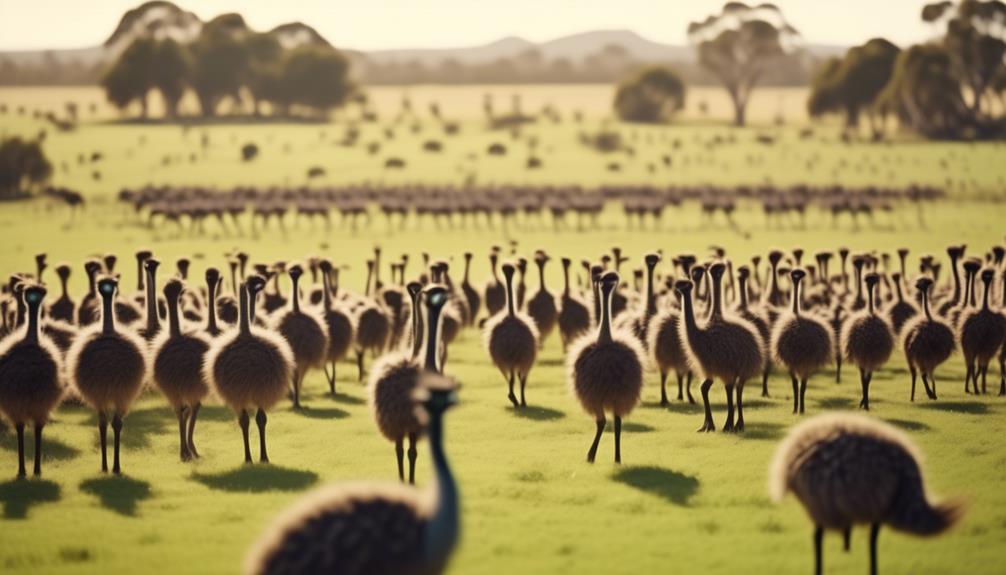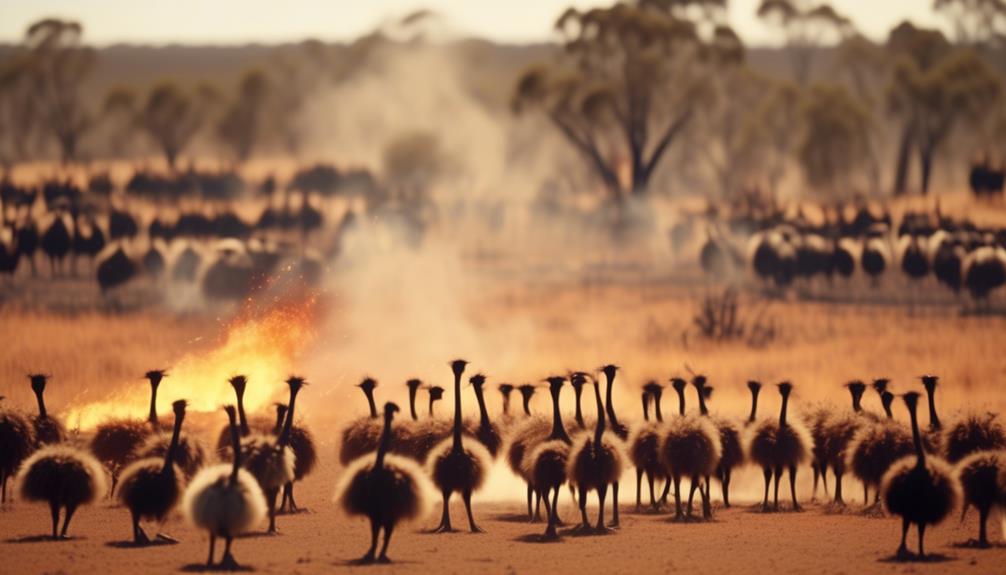
Did you know that Australia is home to over 600,000 wild emus? These majestic flightless birds have played a significant role in Australian agriculture for centuries. From pest control to farming for meat, and even the utilization of their oil and feathers, emus have proven to be a valuable asset to the industry.
But their influence doesn't stop there. In this discussion, we will explore the various roles emus play in Australian agriculture, including their involvement in organic farming practices and indigenous farming traditions.
Furthermore, we will look into the future prospects for emu farming and the potential benefits it holds. So, get ready to discover the fascinating world of emus and their impact on Australian agriculture.
Key Takeaways
- Emus have a significant historical and cultural significance in Australia, with their economic and cultural contributions being recognized.
- Emus play a crucial role in pest control in vineyards and citrus orchards, helping to maintain a healthy ecosystem and protect crops from pests.
- Emu farming offers various products such as lean and nutritious meat, large and unique-tasting eggs, and valuable emu oil, contributing to the culinary industry and other sectors.
- Emus have various environmental benefits in organic agriculture, including pest control, natural fertilization, and adaptability to different climates, making them a sustainable choice for farming practices.
Historical Significance
The historical significance of emus in Australian agriculture can't be understated. These flightless birds have had a profound impact on the country's economy and hold cultural importance for the Australian people.
Emus were first recognized for their economic potential during the early 20th century, when their feathers became highly sought after for fashion accessories. The emu feather industry thrived, providing employment opportunities and contributing significantly to the Australian economy.
However, it was during the Great Depression that emus truly demonstrated their impact on the economy. As farmers struggled to make a living, emus became a valuable source of income. The meat, oil, and leather derived from emus became essential commodities. Emu farming emerged as a viable alternative to traditional agriculture, providing livelihoods and boosting local economies.
Beyond their economic significance, emus hold cultural importance for indigenous Australians. For centuries, these birds have been part of Aboriginal mythology and are considered sacred in many indigenous communities. Emus are often depicted in art and storytelling, symbolizing strength, resilience, and survival.
Emus as Pest Control
Emus' role in Australian agriculture extends beyond their economic and cultural significance, as they've also been utilized as an effective form of pest control. Their ability to forage and consume a wide range of pests makes them valuable assets in vineyards and citrus orchards.
In vineyards, emus help control the population of insects and pests that can damage grapevines. They feed on grasshoppers, beetles, snails, and other pests that can harm the vines and reduce crop yields. Emus also have a keen sense of smell, which enables them to detect pests hiding in the vineyard, such as mealybugs and spider mites. By consuming these pests, emus help maintain a healthy vineyard ecosystem and reduce the need for chemical pesticides.
Similarly, emus play a crucial role in citrus orchards. They're known to feed on fruit flies, which are a major pest for citrus crops. Fruit flies can cause significant damage to citrus fruits, leading to economic losses for farmers. Emus' presence in citrus orchards helps to control the fruit fly population, reducing the need for chemical insecticides and promoting sustainable pest management practices.
Emu Farming for Meat

Emu farming for meat has gained popularity in recent years due to its potential for economic growth and sustainability. Emu meat is lean, low in cholesterol, and high in iron, making it a healthy choice for consumers. The meat is often described as having a rich, beef-like flavor, making it a versatile ingredient in various culinary dishes. Emu eggs also play a role in the culinary industry, as they're larger than chicken eggs and have a unique taste. Many chefs appreciate the emu eggs for their rich and creamy texture, which adds depth to dishes like omelettes and pastries.
Additionally, emu farming provides an opportunity for leather production. Emu leather is highly valued for its durability and softness. It's commonly used in the production of luxury goods such as wallets, handbags, and shoes. The leather is known for its unique grain pattern, which adds to its aesthetic appeal. Emu farming not only offers a sustainable source of meat but also contributes to the production of high-quality leather products.
Utilizing Emu Oil
Utilizing emu oil offers a range of potential benefits in various industries due to its unique properties. Emu oil is derived from the fat of emus, flightless birds native to Australia. This oil has gained attention for its potential health benefits and cosmetic applications.
One of the main health benefits of emu oil is its anti-inflammatory properties. It has been found to reduce inflammation in conditions such as arthritis and skin disorders like eczema and psoriasis. The oil is also rich in omega-3, omega-6, and omega-9 fatty acids, which are essential for maintaining good overall health.
In terms of cosmetic applications, emu oil is known for its moisturizing and nourishing properties. It's easily absorbed by the skin, making it an ideal ingredient in skincare products. Emu oil can help improve skin hydration, reduce the appearance of fine lines and wrinkles, and promote a more youthful complexion.
Furthermore, emu oil has been used in hair care products to promote hair growth and strengthen the hair follicles. Its moisturizing properties also help to combat dry scalp and dandruff.
Emu Feathers and Fashion

With its diverse range of potential applications, emu oil has proven to be a valuable resource not only in health and cosmetics but also in the world of fashion, particularly when it comes to the utilization of emu feathers. Emu feather demand has been steadily increasing in recent years, as designers and consumers alike recognize their unique qualities and versatility.
Here are four reasons why emu feathers have become a sought-after fashion accessory:
- Luxurious Texture: Emu feathers possess a softness and luster that rival those of more traditional materials like silk and fur. When incorporated into clothing and accessories, they add a touch of elegance and sophistication.
- Sustainable Choice: Unlike other feathers used in the fashion industry, emu feathers are a byproduct of the meat industry. By utilizing these feathers, designers contribute to reducing waste and promoting sustainability.
- Artistic Expression: Emu feathers offer a wide range of colors and patterns, allowing designers to unleash their creativity and produce unique and eye-catching garments. From vibrant hues to intricate designs, emu feathers can transform any outfit into a work of art.
- Ethical Alternative: The ethical concerns surrounding the use of fur and other animal products in fashion have led many consumers to seek cruelty-free alternatives. Emu feathers provide a guilt-free option, as they're sourced without causing harm to the birds.
Emus in Organic Agriculture
Organic agriculture has seen a rise in the integration of emus due to their beneficial contributions to sustainable farming practices. Emus aren't only fascinating creatures to have on your farm, but they also serve as great companions in organic farming. These majestic birds can help control pests by eating insects and small rodents that can harm crops. Their strong sense of sight and hearing make them excellent watchdogs, alerting farmers to any potential threats to their organic produce.
But emus' usefulness in organic agriculture doesn't stop there. They also act as natural fertilizers. Emus have a unique digestive system that allows them to break down and process plant matter more efficiently than other animals. This means that when they excrete, their feces are rich in nutrients that can be used to enrich the soil. Emu manure is considered one of the best organic fertilizers due to its high nitrogen content, which promotes healthy plant growth.
In addition to their pest control and fertilizing capabilities, emus are low-maintenance animals that can thrive in organic farming environments. They adapt well to different climates and require minimal amounts of water and feed. Emus also have a gentle and docile nature, making them easy to handle and work with on the farm.
Emus in Indigenous Farming Practices

Emus play a significant role in the agricultural practices of Indigenous communities, contributing to their sustainable farming methods and overall food security. These majestic birds have been an integral part of Indigenous cultural traditions for centuries, symbolizing resilience, strength, and connection to the land. Here are four ways in which emus are deeply intertwined with Indigenous farming practices:
- Cultural traditions: Emus hold a sacred place in Indigenous cultures, representing the ancestral spirits and serving as a symbol of cultural identity. Their presence on the land during farming activities is believed to bring blessings and ensure a successful harvest, fostering a strong sense of community and tradition.
- Traditional medicine: Indigenous communities have long recognized the medicinal properties of emus. Their oil is highly valued for its healing properties, used to treat various ailments such as arthritis, muscle pain, and skin conditions. Emus are also believed to have a spiritual healing power, bringing balance and harmony to individuals and the community as a whole.
- Fertilization: Emus contribute to sustainable farming practices by naturally fertilizing the soil. As they roam and forage, their droppings enrich the land with essential nutrients, promoting healthy plant growth and reducing the need for chemical fertilizers. This organic approach not only improves soil health but also minimizes the impact on the environment.
- Pest control: Emus are excellent pest controllers, particularly when it comes to controlling insects and small rodents. Their voracious appetite for pests helps protect crops from damage, reducing the need for chemical pesticides. This natural pest control method aligns with Indigenous principles of sustainable farming, maintaining a delicate balance between humans, nature, and the ecosystem.
Emus, deeply rooted in Indigenous cultural traditions and traditional medicine, offer valuable contributions to sustainable farming practices. Their presence not only ensures food security but also strengthens the bond between Indigenous communities and the land they've nurtured for generations.
Future Prospects for Emu Farming
The future of emu farming holds promising opportunities for sustainable agriculture and economic growth. Emus are known for their low environmental impact and ability to adapt to diverse habitats, making them an ideal choice for sustainable farming practices. Emu farming can have a significant economic impact, providing opportunities for job creation, income generation, and rural development.
Emu farming can contribute to the economy through various channels. Firstly, emu products such as emu oil, meat, feathers, and eggs have a high demand both domestically and internationally. Emu oil, in particular, is valued for its medicinal properties and is used in the pharmaceutical and cosmetic industries. Additionally, emu farming can diversify income sources for farmers and help reduce reliance on traditional agricultural activities.
In terms of sustainability measures, emu farming requires less water and land compared to traditional livestock farming. Emus are able to graze on native vegetation and can thrive in arid and semi-arid regions, reducing the need for irrigation and pasture maintenance. Furthermore, emu farming has a lower carbon footprint compared to other livestock, contributing to reduced greenhouse gas emissions.
To ensure the future success of emu farming, research and development efforts should focus on improving breeding techniques, enhancing feed efficiency, and expanding market access for emu products. Government support in the form of grants, subsidies, and infrastructure development can also play a crucial role in promoting the growth of this industry.
Frequently Asked Questions
What Is the Average Lifespan of an Emu?
The average lifespan of an emu is around 10-20 years. Emu conservation efforts aim to protect these unique birds and their breeding habits, ensuring their survival for future generations.
How Many Emus Are Currently Used in Organic Agriculture in Australia?
Emus play a significant role in organic agriculture in Australia. They provide numerous benefits, such as pest control and nutrient cycling. There is a growing trend of using emus in farming due to their effectiveness and sustainable practices.
Are Emus Considered Pests in Any Other Countries Besides Australia?
Emus can be considered pests in other countries besides Australia due to their ability to become invasive species. However, emu farming can be a sustainable practice that helps control their population while providing economic benefits.
Can Emu Oil Be Used for Medicinal Purposes?
Can emu oil be used for medicinal purposes? Emu oil has been hailed for its potential benefits, such as reducing inflammation and promoting wound healing. However, it is important to consider potential side effects and risks before using it.
Are There Any Regulations or Guidelines for Emu Farming in Australia?
In Australia, there are regulations and guidelines for emu farming. These rules help ensure the welfare of the emus and the sustainability of the industry. Let's explore the pros and cons of emu farming together.
Conclusion
In conclusion, emus have played a significant role in Australian agriculture throughout history. They've been utilized as pest control, their meat and oil have been harvested for commercial purposes, and their feathers have been used in fashion.
Emus have also shown potential in organic and indigenous farming practices. Their ability to adapt to different environments and their low maintenance requirements make them an attractive option for sustainable farming methods.
Looking ahead, the future prospects for emu farming seem promising. As the demand for organic and locally sourced products continues to grow, emu meat and oil could become sought-after commodities. Additionally, the potential for emu feathers to be used in eco-friendly fashion and artisanal crafts presents new opportunities for the industry.
Will emus continue to be a valuable asset in Australian agriculture? Only time will tell, but their versatility and potential for sustainable farming practices suggest that they could play a crucial role in the future of Australian agriculture.




